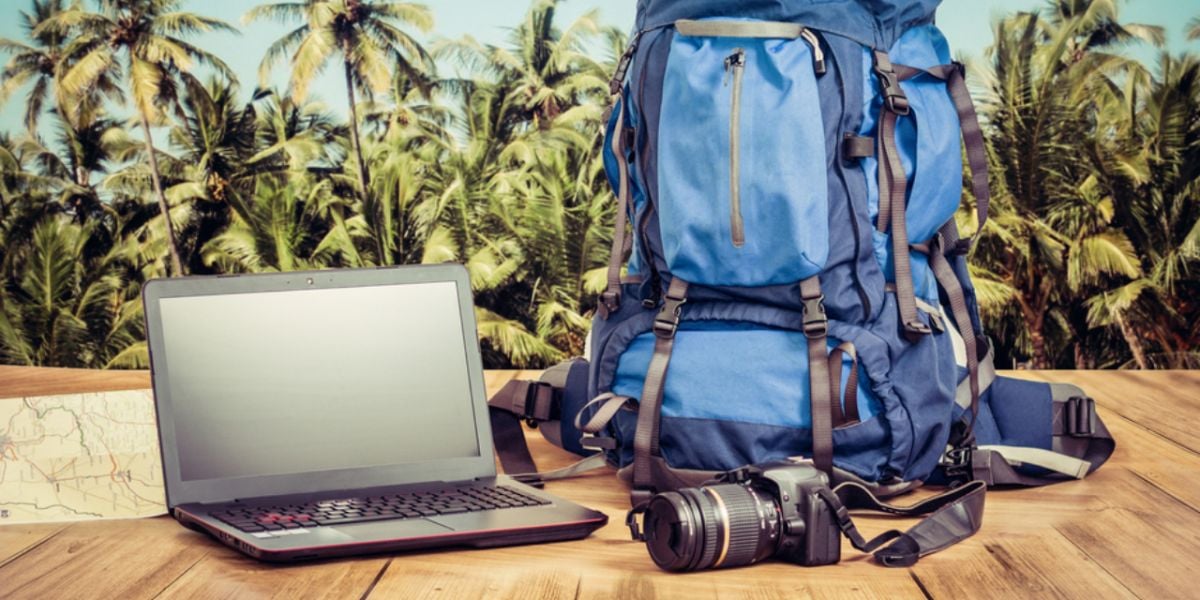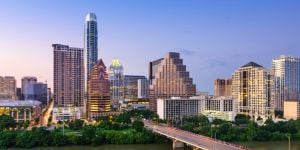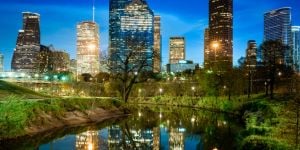
It's hard to find a digital nomad out there who doesn't have a road trip through the US on their bucket list. The third-largest country in the world has a lot to offer its visitors — from the thriving innovation-driven environment to the incredible coastline and world-famous sightseeing. Before you hop on the plane, there are a few pesky details to take care of, like sorting out visas and taxes and making sure you've got a good internet connection.
Why is the United States a good destination for digital nomads?
Most digital nomads have considered traveling to the US at least once, and many have the country on their list of must-visit destinations. Home to Silicon Valley, the world's number one tech, innovation, and startup hub, the globe's third-largest country is one of the best places for networking, coworking, bringing your projects to life, and getting ideas and inspiration. The thriving entrepreneurial scene is the main factor in making the US a popular digital nomad destination and the country's many natural, historical, and cultural attractions. Bear in mind that the US is not a low-cost destination, and staying here for the long term will be so much more expensive than Thailand or Indonesia, for example. However, if you're careful with your budget and prepared to make some compromises, being a digital nomad in the USA is definitely doable.
Visa requirements for digital nomads in the US
Before you can begin your free-wheeling digital nomad life in the USA, you have to have an appropriate visa that allows you to work remotely in the United States legally.
As of 2025, the United States offers a dedicated Digital Nomad Visa (USDN), which allows remote workers to live in the country for up to three years. To qualify, you must earn a minimum of $4,500 per month, have valid health insurance, and a clean criminal record. Remote work is permitted only for foreign employers or clients, although consulting for US clients is allowed if payment is processed through a non-US entity.
The application process is all done online and includes a biometric appointment, a virtual interview, and completion of Form DS-DN25. Processing times are typically 30 days. This visa provides a legal and transparent pathway for digital nomads and replaces the need to rely on temporary visitor or business visas for remote work purposes. Using B-1 or J-1 visas for this purpose is no longer recommended.
Tax obligations for digital nomads in the USA
Taxes can be complex for digital nomads, as you may be planning to provide services to clients from multiple international locations, as well as within the USA. The Foreign Earned Income Exclusion (FEIE) for US citizens living abroad has recently increased to $130,000, and the self-employment tax cap now applies to income up to $176,100. While there is ongoing discussion around shifting to residence-based taxation, citizenship-based taxation remains in effect, meaning that U.S. citizens and green card holders must continue to report and pay tax on their worldwide income regardless of where they live.
For non-U.S. citizens working remotely while in the United States, it's important to understand both your home country's tax rules and any potential US tax obligations that could arise. Even if you're earning income from foreign sources, your presence in the US could have tax implications depending on the length of your stay and visa type. Therefore, it's essential to understand your tax obligations as a digital nomad working in the United States, which means that before you can start daydreaming about your new lifestyle, you have to do the legwork of researching tax laws, potential tax liabilities, and reporting requirements.
Health and travel insurance in the USA
Though you are going to be living a somewhat rootless life, it's really important to make sure the basics are taken care of. If you don't have a regular 9 to 5, you potentially are also not getting health insurance provided by your employer, and without family support or a regular home base, your life might lack some basic stability. One way to put your mind at rest when embarking on an adventure like this is getting good health and travel insurance coverage while in the United States. There are lots of international health insurance options that provide comprehensive coverage for medical expenses and emergency situations – and some are geared towards digital nomads. Providers like Genki and SafeyWing offer products that take into account all of the aspects of the digital nomad lifestyle.
Cost of living in the USA
There are lots of different ways to be a digital nomad. Do you plan to live in several places in short-term rentals or Airbnb, or are you planning on being a nomad further and trying out living in a camper or renovating a van? Maybe you're planning to stay with friends part of the time and couch-surf your way across the country. Whichever it is, we highly recommend that you research and plan for the cost of living in the areas you intend to stay and factor in other things like vehicle costs, gas, and campsite costs if you're sleeping in a camper. Remember that living expenses can vary significantly depending on the region and city. There are plenty of online guides and YouTube videos that break down the reality of living as a digital nomad, but it's really important you have a realistic expectation of costs. Bear in mind also that things can change quickly – it's really important to have an emergency fund so that you can get home quickly if you need to. The COVID-19 epidemic was not anticipated, but there are global events that can definitely put a spanner in the works, and it's best to be prepared for worst-case scenarios.
Good to know:
The average digital nomad in the United States earns $123,762 annually, with most earning between $50,000 and $250,000. To qualify for the Digital Nomad Visa, you must show a minimum monthly income of $4,500.
Time zones in the USA
Consider the time zone differences between your home country and the United States. Consider how it may impact your work schedule, communication with clients or colleagues, and maintaining a work-life balance. Not all jobs center on meeting at specific times or being available to clients at certain hours, but the reality is that many do – be realistic about whether your work will suffer if it's the middle of the night where you are when the rest of your team is doing the daily meeting. Remember, the US contains multiple time zones, so you may hang around the East Coast or the West Coast more, depending on where most of your clients are based.
Important considerations when working remotely from the US
Although being a digital nomad might sound dreamy, some downsides can come with the itinerant lifestyle. Make sure to take your rose-tinted spectacles off and look at the other side of the story, too. Reported negatives associated with being a digital nomad include:
- isolation and loneliness;
- work-life balance challenges;
- lack of routine;
- limited access to healthcare;
- legal and administrative complexities;
- uncertain income and financial stability;
- travel fatigue.
Aspiring digital nomads should be aware of these potential challenges and consider strategies to address them. There are plenty of online communities for digital nomads where you can ask questions and gain support; we recommend the digital nomad subreddit to get started.
Best US cities to work from
If it's inspiration you are looking for, there is no skipping New York on your trip. Praised by Frank Sinatra as the place for the ultimate skill test ('If I can make it here, I can make it anywhere'), New York is a place of motivation, exchange, and achievement.
If what you are looking for is combining your work hours with some relaxing beach time and the chance of running into celebrities on the street, Los Angeles is the perfect spot to explore. Known for its stunning coastline, young and hip work culture, vibrant boutique coffee scene, and one-of-a-kind nightlife, LA is one of the world's most popular travel destinations and home to a growing freelance and digital nomad community.
San Francisco is the Bay Area's centerpiece and one of the most visited cities in the United States and the world. With its hilly terrain, signature summer fog, and all things high-tech, it's a city where the hippie and yuppie cultures live alongside the backdrop of mushrooming young startups. Here, you will not only find a myriad of coffee shops catering to the freelancer but also one of the best possible selections of coworking spaces and world-class networking.
Dallas may not be the first city that comes to mind when you think of a digital nomad lifestyle, yet it ranks among the top nomad-friendly cities in the US. The city is rated highly for safety and, what's of note, walkability. Dallas also has more restaurants per capita than New York City, offering a friendly setting for nomads and foodies alike.
Internet speed in the USA
If possible, try and figure out in advance if reliable and high-speed internet connectivity is available in the locations you plan to work from. Research co-working spaces, libraries, cafes, or accommodations with reliable internet access to support your remote work requirements. Some work is much more suited to the digital nomad lifestyle than others, so be realistic about what kind of space you need to work in and how much stability you require. If you need dead silence and your screen and desk positioned in very specific ways, being a digital nomad might not be your jam.
As of 2025, the average internet speed in the United States is 214 Mbps.
The top five states for internet speed are:
- Delaware – 246.95 Mbps
- Maryland – 238.26 Mbps
- New Jersey – 235.67 Mbps
- Rhode Island – 233.30 Mbps
- Connecticut – 229.13 Mbps
The states with the slowest internet speeds are Arkansas, Oklahoma, Mississippi, Montana, and Wyoming.
Coworking locations in the US
New co-working spaces pop up all the time in major cities, and there are a variety of pricing models out there to suit a range of needs, from casual to daily use. If consistent WiFi, power outlets and desk space are essential, joining a dedicated co-working space might be necessary for you. Otherwise, you can risk the distractions and patchy internet of cafes and public libraries. Below are a few suggestions of co-working spaces in major cities.
New York
The Farm SoHo
447 Broadway, 2nd Floor, New York, NY 10013
Website: thefarmsoho.com
The Commons
157 East 86th Street, 4th Floor, New York, NY 10028
Website: thecommonsnyc.com
Primary
26 Broadway, New York, NY 10004
Website: liveprimary.com
Los Angeles
Village Workspaces
11845 W Olympic Blvd, Suite 1100W, Los Angeles, CA 90064
Website: villageworkspaces.com
LAX Coworking
9100 S Sepulveda Blvd, Suite 210, Los Angeles, CA 90045
Website: laxcoworking.com
San Francisco
DropDesk @ Foragers Present
1186 Valencia Street, San Francisco, CA 94110
Website: drop-desk.com
CANOPY Pacific Heights
2193 Fillmore Street, San Francisco, CA 94115
Website: canopy.space
Dallas
SPACES – McKinney Avenue
1919 McKinney Avenue, Suite 100, Dallas, TX 75201
Website: spacesworks.com
Useful links:
We do our best to provide accurate and up to date information. However, if you have noticed any inaccuracies in this article, please let us know in the comments section below.








